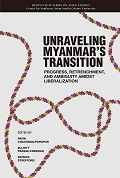The optimism provoked by Myanmar’s political reforms in 2011-2012 has now given way to a sense that the uneven nature of change in this nation of 54 million has led to instability and uncertainty.
The liberalization of critical sectors and expansion of certain freedoms―such as political and legal opportunities for expression and mobilization―contrasts with the entrenchment of structural problems. It becomes ever more difficult to tackle ethnic marginalization and conflict, over-dependence on natural resource extraction, inadequate public services, and problems of under-capacity in the civilian bureaucracy.
The result is the build up of a toxic environment in which classism, racism, and bigotry threaten to rend Myanmar’s already delicate social fabric.
The contributors to this volume bring unique perspectives and methodologies to bear to unravel Myanmar’s tangled challenges. Whether it is through studying corruption by analyzing the country’s real estate bubble, assessing civil society advocacy capacity against extractive industries, or gauging the strength – and surprising weakness – of Myanmar’s military, the volume employs unconventional approaches and analytical rigor to address a fundamental question: is Myanmar itself unraveling?
Contents
List of Illustration
Foreword by David I. Steinberg
Introduction
Elliott Prasse-Freeman, Pavin Chachavalpongpun, and Patrick Strefford
SECTION ONE: THE POLITICAL LANDSCAPE
Chapter 1
Post-Elections Myanmar: Options, Opportunities or Challenges?
Aung Tun
Chapter 2
Fragile Balance of Civil-Military Relations in Myanmar
Yoshihiro Nakanishi
Chapter 3
Myanmar’s Post-2015 Foreign Policy: Prisms of Interpretation
Moe Thuzar and Pavin Chachavalpongpun
SECTION TWO: THE CHALLENGE OF THE POLITICAL ECONOMY
Chapter 4
The Structure of Myanmar’s Corporate and Financial System: Growth Challenges since the 1990s
Fumiharu Mieno
Chapter 5
Urban Real Estate and the Financial System in Myanmar
Bo Bo Nge
Chapter 6
Myanmar’s Environmental Governance in Transition: 136 The Case of the Extractive Industries Transparency Initiative-
Marjanneke J. Vijge and Adam Simpson
SECTION THREE: THE SOCIO-CULTURAL ISSUES
Chapter 7
The Post-2011 Transition in Myanmar: Donor-driven Aid and Donor Capacity DeficitPatrick Strefford
Chapter 8
Ethnic Education Systems in Burma: Possibilities for Harmonization and Integration
Patrick McCormick
Chapter 9
Myanmar’s Political Transition and Its Eザects on the Buddhist Religio-Political Landscape
Matthew J. Walton
SECTION FOUR: THE ROHINGYA CRISIS
Chapter 10
Motherhood, Home, and the Political Economy of Rohingya Women’s Labor
Shae A. Frydenlund
Chapter 11
Two Sides of the Same Arakanese Coin: “Rakhine,” “Rohingya,” and Ethnogenesis as Schismogenesis
Elliott Prasse-Freeman and Kirt Mausert
Contributors
Index
